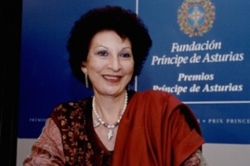Acclaimed Islamic Feminist Remembered as Champion of Social Justice
 January 26, 2016
January 26, 2016
By Emily Evans | Alumni Relations
Fatima Mernissi, MA’72, PhD’74, a Moroccan sociologist who was one of the founders of Islamic feminism, was remembered as a true champion of social justice by her fellow Brandeisians.
Mernissi, who earned graduate degrees in sociology from Brandeis, died in her native Morocco on Nov. 30, 2015. She was 75.
Her pioneering work included studies of the sexual politics of Islamic Scripture and a book, “Dreams of Trespass: Tales of a Harem Girlhood,” based on her childhood in a domestic harem, which has been published in nearly 30 languages. She was a professor for many years at Mohammed V University in Rabat, Morocco’s capital.
In 2003, Mernissi received the Princess of Asturias Award for letters, the Spanish equivalent of the Nobel Prize for literature. Her first book, “Beyond the Veil: Male-Female Dynamics in a Modern Muslim Society,” was based on her dissertation at Brandeis.
George Ross, professor emeritus of labor and social thought at Brandeis, recalled Mernissi as a “charismatic” student who was focused on bringing about change in her native country.
“Mernissi was deeply involved in trying to sociologize Morocco and the situation of women there on her own terms,” Ross remembered in an e-mail. “She was profoundly creative, and she had new things to teach us – she was gifted at doing so.”
According to Ross, Mernissi fit in well on a Brandeis campus that welcomed and encouraged student examinations and discussion of many temporal justice issues, including the Vietnam War, racism, feminism and economic inequality.
“Brandeis was radical in a liberal, rational, Socratic and determined way,” wrote Ross, who served as Mernissi’s teacher and graduate adviser. “Rebellious ideas had their place as long as those who promoted them did so in an open and rigorous fashion. Fatima was a very important part of this.
“She had a great capacity for befriending others, and a gentle and humorous way of entering into deeply serious discussions that always helped us get deeper into what we were trying to understand. She was a creative, committed intellectual with a great cause to elaborate.”
Sociology professor Gordie Fellman remembers working with Mernissi more than four decades ago. “She was an outstanding rebel and challenger of the status quo,” he wrote in an e-mail.
Through her endeavors as a writer, teacher and sociologist, Mernissi espoused a philosophy of acceptance and equality. And she wasn’t just a thinker – she was an active agent for change. Mernissi recognized gender inequality in both Islamic and Western societies, and in religious traditions across the spectrum. She fought for human rights by organizing lectures, participating in workshops and authoring progressive works that were eye-opening to a wide range of audiences.
“Mernissi was deeply committed to struggle against the inequalities between women and men in Islamic societies,” Ross said. “She was a pioneering and towering Islamic feminist. It does not demand much imagination to know how courageous and difficult an endeavor this was.
“She made a great difference because she never gave up.”






